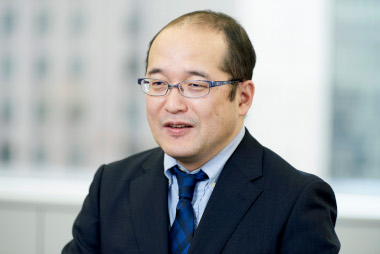
Junior Partner Nob Yamanaka
Qualification
Patent Attorney (Japan)
Certified to practice IP litigation in Japan
Ph.D.
Practice Areas
Patent
Electrical Engineering, Electronics, Software/ Mechanics, Optics
Dr. Yamanaka specializes in organic physics, mechanics and electronics.
Education
Doctor of Physics, Graduate School of Science, The University of Tokyo
Bachelor of Quantum Engineering and Systems Science with an emphasis in Engineering, The University of Tokyo
Work Experience
Dr. Yamanaka received his Doctor of Physics degree at Tokyo University in 1999. He was consecutively a fellow at the university of Tokyo (the Japan Society for Promotion of Science), Institute of Space and Astronautical Science (JAXA), and Institute of Physical and Chemical Research (RIKEN), where he was engaged in the theory of atomic physics, including the study of highly charged ions, antiprotonic atoms, and antihydrogen atoms. After passing the patent attorney examination in 2012 while working at an intellectual property law firm in Japan.
Research Content
Dr. Yamanaka was interested in fundamental physics related to radiation therapy and engaged in theoretical studies in atomic physics. At the University of Tokyo (April 1996 - March 1999), he researched highly charged ions at the Institute of Space and Astronautical Science (currently JAXA). He studied behaviors of multi-electron correlations, where multiple electrons bound in a Coulomb field of a nucleus interplay, using the Multi-Configurational Hartree-Fock method [1-6]. Furthermore, he described and studied nuclear effects such as finite mass, finite volume, and internal polarization degrees of freedom of nuclei, along with relativistic effects and quantum electrodynamics (QED) effects within the QED framework, since it is impossible to approximate the nuclei as a point charge with an infinite mass when electrons are strongly bound to the nuclei [7-9].
He participated in "Antimatter Science with Antiprotons" and "Spectroscopy of Antihydrogen Atoms" at Japan Society for the Promotion of Science (April 1999 - March 2002), RIKEN (April 2002 - March 2005), and University of Tokyo (April 2005 - March 2006). Through high-precision structure calculations of helium atoms containing antiprotons, which have the same negative charge as electrons but the same large mass as protons, he researched "Hyperfine Structure of Antiprotonic Helium Atoms and Precise Verification of CPT Symmetry" [10]. Furthermore, he developed a theoretical framework for the dynamics of antiparticles or antimatter atoms such as positrons, antiprotons, and antihydrogen atoms and researched the "Precision Theory of Coulomb Three-Body Dynamics" and "Theory of Antihydrogen Atom Formation" [11-20].
[1] N. Yamanaka, "Calculations of specific mass shifts in Be II (1s22s2S, 1s22p2P)", Phys.Lett.A243,132-136 (1998).
[2] N. Yamanaka and A. Ichimura, "Nuclear Polarization Effect on Hyperfine Interaction in Hydrogen-Like Ions", Phys.Scr.T80, 488-490 (1999).
[3] N. Yamanaka, "Calculation of mass polarization for the 1s22s2S and 1s22p2P states in Li-like ions", J.Phys.B32, 1597-1605 (1999).
[4] N. Yamanaka, "Multi-configurational Hartree-Fock Calculations of the Hyperfine Structure Constants for the 1s22s2S and 1s22p2P States of 7Li and 9Be+", J.Phys.Soc. Japan 68,2561-2569 (1999).
[5] N.Yamanaka, "Mass polarization effect in He-like ions", J.Phys.B34, 4271-4277 (2001).
[6] N. Yamanaka, "Hyperfine anomaly for the ground state of 9Be+", Hyperfine Interactions 127, 129-132 (2000).
[7] N. Yamanaka, Y. Horikawa, andA. Ichimura, "Formulation of nuclear polarization correction with the Feynman photon propagator", Hyperfine Interactions 127, 297-300 (2000).
[8] N. Yamanaka, Y. Horikawa, and A. Ichimura, "Transverse interaction contribution to the nuclear polarization effect", Phys.Scr.T92, 451-453 (2001).
[9] N.Yamanaka, A.Haga, Y.Horikawa, and A.Ichimura, "Nuclear polarization in hydrogen-like heavy ions," Phys.Rev.A63, 062502(1-9)(2001).
[10] N.Yamanaka, Y.Kino, H.Kudo, and M.Kamimura, "Coupled rearrangement channel calculation of the fine and hyperfine structures of the antiprotonic helium atom", Phys.Rev.A63, 012518(1-6)(2001).
[11] N.Yamanaka and Y.Kino, "Time-dependent coupled channel calculation of muon-transfer cross-section in muonic deuterium and triton collision", Hyperfine Interactions 138, 85-90 (2001).
[12] N.Yamanaka and Y.Kino, "Time-dependent coupled channel calculations of positronium-formation cross sections in positron-hydrogen collisions", Phys.Rev.A64, 042715(1-10)(2001).
[13] N.Yamanaka and Y.Kino, "Antihydrogen-formation cross sections in antiproton-positronium collisions with a time-dependent coupled-channel method", Phys.Rev.A65, 062709(1-6)(2002).
[14] N. Yamanaka and Y. Kino, "Time-dependent coupled channel calculations of the annihilation rate in positron-hydrogen collisions", Hyperfine Interactions 146/147, 337-341(2003).
[15] N.Yamanaka, Y.Kino, Y.Takano, H.Kudo, and A.Ichimura, "Enhancement of direct positron annihilation due to temporal capture by an atom", Phys.Rev.A67, 052712(1-4)(2003).
[16] N. Yamanaka and Y. Kino, "Time-dependent coupled-channel calculation for elastic scattering of positrons by hydrogen atoms and helium ions", Phys.Rev.A68, 052715(1-6)(2003).
[17] N. Yamanaka and Y. Kino, "Antihydrogen formation in antiproton-positronium collisions", Nuclear Instruments & Methods in Physics Research B214, 40-43 (2004).
[18] N.Yamanaka, Y.Kino, Y.Takano, H.Kudo, and A.Ichimura, "Direct positron annihilation and positronium formation", Material Science Forum, 445/446, 449-451 (2004).
[19] N. Yamanaka, Y. Kino, and A. Ichimura, "Wave packet analysis of multichannel resonances in positron scattering by helium ion", Phys. Rev. A70, 062701(1-5) (2004).
[20] N.Yamanaka and A.Ichimura, "Channel coupling array theory for Coulomb three-body dynamics: antiproton capture by hydrogen atoms", Phys. Rev. A74, 012503(1-9) (2006).
Membership
Japan Patent Attorneys Association (JPAA)
